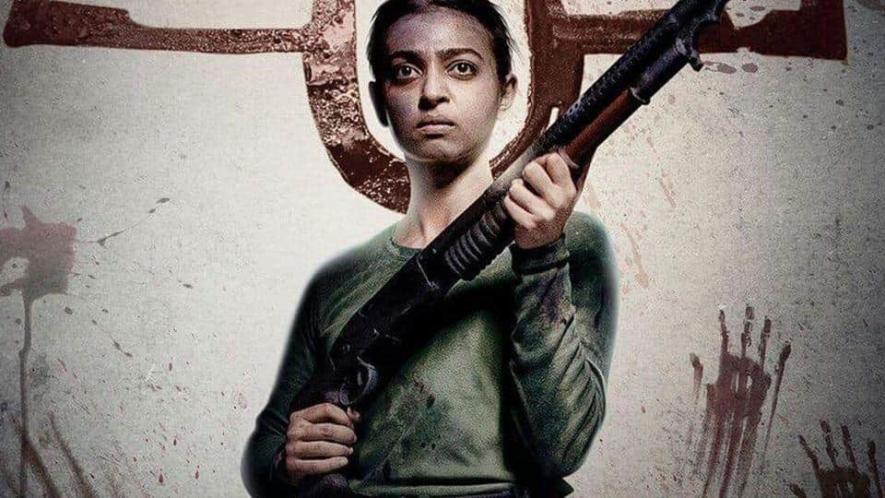‘Ghoul’: Do We Have Answers to the Questions It Raises?

In his famous dystopian novel 1984, George Orwell describes a scenario in which children were used to spy on their parents and report their ‘deviation’ to the “thought police of the Big Brother,” who was the leader of a totalitarian state.
This theme forms the very basis of Netflix India’s newest mini TV series Ghoul. Ghoul denotes an undead monster that consumes human flesh, and has the ability to change shapes. It is pre-Islamic in origin, though it was adopted later by the Islamic mythology. Some references are also found in the famous short stories collection, One Thousand and One Nights.
Directed by Patrick Graham, starring Radhika Apte and Manav Kaul, Ghoul is set in a dystopian India, a theme which has not been much explored in both Indian Literature and Indian Cinema. Dystopia, as a genre in fiction, is generally a critique of contemporary society and is a subtle comment on the socio-political sphere of the society that we dwell in. Patrick Graham shows that we, as a society (and as a nation), have walked down that path where a dystopian future is not a distant possibility.
The series begins with the capture of a terrorist named Ali Saeed (Mahesh Balraj) by elite security forces and Nida Rahim (Radhika Apte) reporting her father (S.M. Zaheer) to the National Protection force headed by Col. Dacunha (Manav Kaul) for possession of ‘anti-national’ literature. The narrative then shifts to interrogation cum detention camp named Meghdoot 31, where suspected terrorists are interrogated and are ‘broken down’. The cinematographic depiction of the claustrophobic environment that is of Meghdoot 31 (lacking sunlight, etc.) is enough to give you chills. Nida Rahim is transferred to the camp for interrogation of Ali Saeed and she is a constantly suspected of being in cahoots with Ali Saeed by Major Lakshmi (Ratnabali Bhattacharjee).
This series is set up in the backdrop of a security state which is heavily Islamophobic as there is no distinction between bombs, ‘bada’ (beef), contraband and what is called anti-national literature. The possession of all these is enough for being labeled as a ‘terrorist’ and ‘anti-national’. The other theme which finds mention in the series is that of ‘wapasi’, a program to re-educate the deviated people and bring them back to the mainstream rules of operating in this dystopian society. The series also reflects on how hyper-nationalism acts as a justification and rationalises acts which no one will want to indulge in and are contrary to human nature, ultimately leading to alienation from the self. The interrogators of Meghdoot 31 are not able to sleep, and are haunted in their dreams while the Colonel indulges in heavy drinking. Though this series is set in India, as the director and writer of the show are British, we see a bit of ‘Hollywood touch’ in the series. Right from the body language of the security forces to the depiction of ‘dystopia’ to more subtle themes like ‘individual’ and ‘family’. For example, Col. Dacunha has a broken family, and indulges in domestic violence, while the chief interrogators are haunted by their conscience, and Nida dreams of her father. This series mainly focuses on the security forces and their mental health, while completely ignoring the social reality under a totalitarian state, except for the ones who are directly affected.
“Ghoul” is a commentary on the current state of affairs in the Indian society. It is mostly dark in nature.
This show certainly has its limitations, in the sense that it follows the same old narrative of the dystopian genre, where the whole responsibility of resistance is on one individual (as Nida Rahim, when asked if she wishes to take on the state, she calls the ‘Ghoul’), while the society at large is either a victim or a passive supporter/onlooker. The resistance to the oppression in this series in offered by an individual that too with the help of supernatural as humans are docile and simply incapable vis-a-vis a strong state.
With the depiction of what goes on in a totalitarian state and the detention centres, rationalised by the slogans of ‘nationalism’, this show does throw a few important questions in the end. As Nida Rahim has to prove her ‘nationalism’ and ‘loyalty’ to the state by reporting her father and almost all terrorist are ‘Muslim’, this series asks us, what will it take and what are the parameters for a Muslim to prove that he/she is a patriotic nationalist? ‘Ghoul’ in the series attacks only the wrongdoers or who have done something wrong, and doesn’t touch the innocent, as all interrogators except Nida and all detainees except one are killed. So this show asks us, who is the real ‘Ghoul’? Who is undead and survives on human flesh?
Author is research scholar in JNU.
Get the latest reports & analysis with people's perspective on Protests, movements & deep analytical videos, discussions of the current affairs in your Telegram app. Subscribe to NewsClick's Telegram channel & get Real-Time updates on stories, as they get published on our website.














